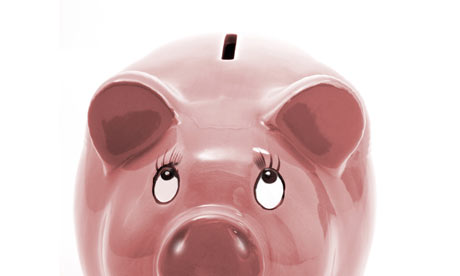
When you've read an excessive number of self-help books, you can't help but internalise some of their outlook on life, and this has been causing me difficulties with regard to the current recession. I haven't reached the stage of screaming, "You're poor because you chose to be poor!" at homeless people. (I refer you to the obnoxious Larry Winget, author of You're Broke Because You Want To Be - though Winget's obnoxiousness is a pose, and, to be fair, he's only making explicit an attitude that's implicit in other books: if you're not super-rich, you're not trying hard enough.) On the other hand, I've evidently absorbed enough positive thinking to find myself growing impatient during conversations in which friends - usually friends who aren't at imminent risk of penury - try to outdo each other with gloomy predictions. It's not that the situation isn't extremely serious. It's just that all this competitive upsetting doesn't seem, particularly, to help.
So I've been delighted to discover a handful of blogs dedicated to the topic of frugality that take things seriously yet not fatalistically, thereby managing, against all odds, to make the process of not spending money actively enjoyable. (I'm aware that frugal behaviour may make matters worse, on a macroeconomic scale, but if you're reading this column for macroeconomic wisdom, God help you.) The best of these sites, including TheSimpleDollar.com and GetRichSlowly.org, apply the online phenomenon of "lifehacking" - simple tricks for happier and more productive living - to money management, thereby transforming it from a chore to a geeky project, which pitiful people like me find fun.
The frugality-hackers' key insight is that, while everyone knows humans are irrational about money - the crisis itself is a manifestation of that - most personal finance advice assumes we're rational. Tried keeping to a personal budget recently? As with any solution dependent on self-discipline, constant vigilance is exhausting. Instead, argues the frugality-blogger Trent Hamm, you have to find ways to make it more convenient not to spend money than to spend it, which might involve something as basic as leaving your credit card at home. Of course, if you can possibly afford it, you should be spiriting a portion of your pay cheque into a hard-to-access account. Most of us live up to our means; tricking your brain into believing your means are smaller than they are is the least painful way to save.
Or take debt. If you have multiple debts, conventional wisdom dictates paying off the one with the highest interest rate, where possible; otherwise, you're bleeding money. But lifehackers prefer the "debt snowball": regardless of interest rates, start with the smallest balance, then the next, etcetera. It doesn't make mathematical sense. But the psychological boost that comes from quickly eliminating a debt, then another, will provide momentum to keep going. Everyone's irrational; the challenge is to work with your irrationality, not against it.
Should you need further evidence that we're not logical about money, by the way, consider the recent American study in which people responded much more favourably to an offer of 300 cents than to one of $3. Sometimes, one despairs.
oliver.burkeman@theguardian.com

